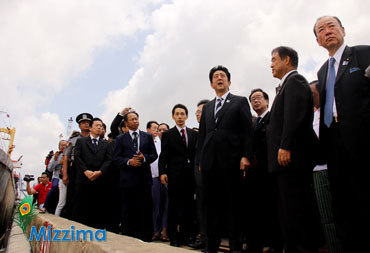Japan’s Prime Minister Shinzo Abe has concluded a three-day visit to Myanmar during which time he visited the Thilawa port his country is helping to finance, met with President Thein Sein and senior ministers in Naypyitaw, and pledged maximum support for the Myanmar government’s economic reforms.
 Though many foreign leaders have come and gone, and such visits—since US President Barack Obama arrived in November last year—command fewer column inches in the domestic press, this one is nonetheless very important.
Though many foreign leaders have come and gone, and such visits—since US President Barack Obama arrived in November last year—command fewer column inches in the domestic press, this one is nonetheless very important.
Japan’s ties with Myanmar are longstanding and have usually been close and have existed on different levels. While the war experience in the 1940s devastated the then British colony, there were those in the independence movement who recognized and benefited from Japan’s help in loosening the bonds of colonial rule.
Japanese of an older generation have long had a special place in their hearts for the country. Biruma no tategoto (The Burmese Harp) was a huge success, first as a book and then a 1956 movie. Despite its war theme, it displayed the inherent beauty and timeless rhythms of the Myanmar countryside. In the end, the main character—a Japanese soldier—becomes a monk and stays in Myanmar. Filmgoers often left the cinemas with tears in their eyes.
More important than any psychological connection has been Japan’s continuing role in supporting the Myanmar economy. In the 1980s, it was Myanmar’s number one source of FDI. Even in the subsequent decades, when many nations in the West considered Myanmar a pariah state, Japan always seemed reluctant to join in both the verbal and economic methods of showing disapproval exercised by many Western nations. It preferred constructive engagement—a soft word here and there—rather than loud hectoring.
In the last few years Japan and Japanese entities have moved smartly to both support and take advantage of the reform process in Myanmar. Last year, Japan agreed to forgive a huge amount of the debt Myanmar had accrued. Tokyo has already started with development projects—focused on helping people and communities—and many more are in the works. Myanmar opposition leader Aung San Suu Kyi, who herself once lived and studied in Kyoto, has both welcomed Japanese investment and called for more.
Japanese firms, depending on their circumstances, have come in to invest, to take a look, or expand what business arrangements they already have. There’s everything from small-scale investors teaming up with domestic garment manufacturers to giants of the Japanese business firmament. Prime Minister Abe is bringing 30 top business executives with him to Naypyitaw as part of his efforts to expand trade.
With all such top-level visits there are sub-texts, not often voiced upon at length in the media. These are indeed interesting times for Japan. Abenomics is the word used to describe the Japanese PM’s huge stimulus package—an attempt to shock the world’s third largest economy out of a decades-long pattern of stagnation. It’s too early to tell what the final effect will be, but the early signs are showing increased business confidence. More confidence means more willingness to look at investments at home and abroad.
Tokyo is also, given the potentially dangerous islands dispute with China, not unaware of the political dimensions in engaging closer with Myanmar, and wean it off any imbalanced dependence upon China. This is something that retired Japanese diplomats have certainly expressed in private and something Tokyo has long pressed the United States to do.
Thus, this visit by Prime Minister Abe was timely—it will boost confidence at home and trade benefits for both countries. It will also enhance Abe’s economic goals. For Myanmar, it is another “feather in its cap” on the fast track to economic growth.



